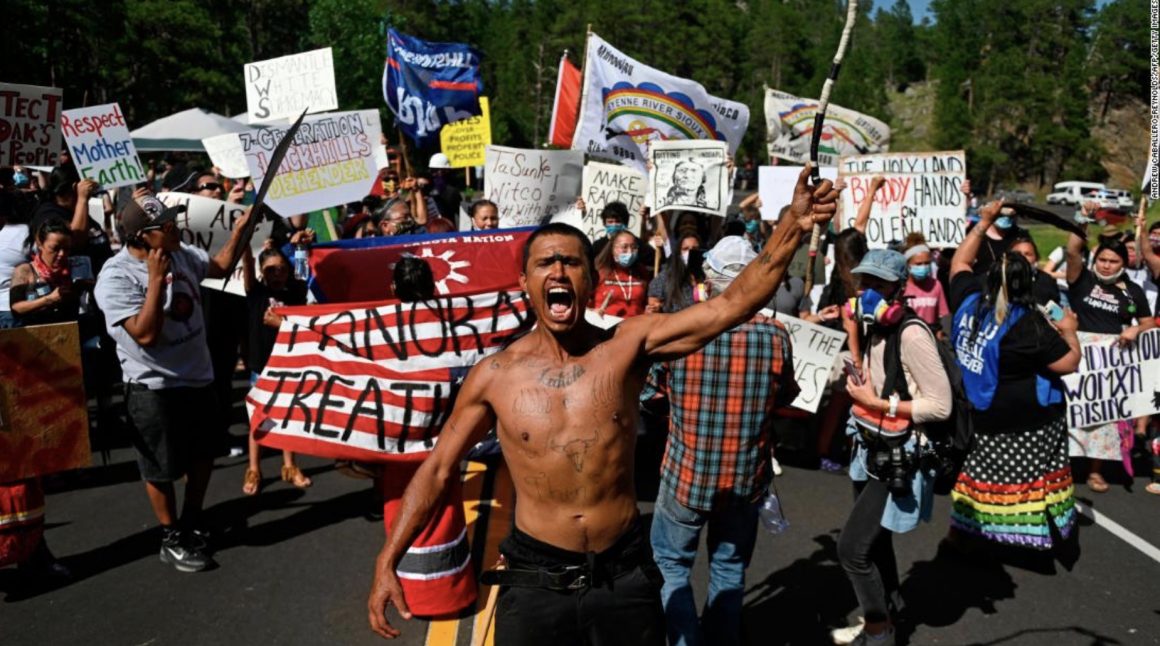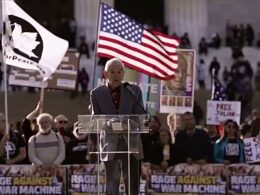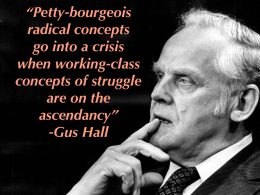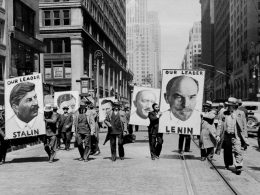In The Foundations of Leninism, Stalin wrote that “Leninism brought the national question down from the lofty heights of high-sounding declarations to solid ground, and declared that pronouncements about the ‘equality of nations’ not backed by the direct support of the proletarian parties for the liberation struggle of the oppressed nations are meaningless and false. In this way the question of the oppressed nations become one of supporting the oppressed nations, of rendering real and continuous assistance to them in their struggle against imperialism for real equality of nations, for their independent existence as states.”
What does this mean in the context of Amerikkka, where a rogue British colony has snatched up almost all the land from the Indigenous First Nations? A clue as to what it means can be found within a news story about a recent confrontation within my area between the settlers and the tribes. It was about a developer who began a construction project on a historic Wiyot village site, then was forced by the representatives of the three local tribes to make every concession short of a formal apology. Frustrated and impatient, he sought to reach a compromise in which he would still be able to impose his development model onto the Native territory, then found out that the tribal leaderships weren’t ready to approve the plan. As the North Coast Journal has reported about the man’s feeling of betrayal at this:
That apparent disconnect exploded at the Aug. 18 meeting, with a representative of [developer] Schneider’s saying the tribes had “lied” and [commission chair] Bongio decrying the two tribes and the California Coastal Commission for going “after one individual,” accusing the tribes of playing games, saying his trust in the tribes had been lost while intoning they were extorting Schneider. Bongio also warned the situation would set a precedent “like you wouldn’t believe.” “Nothing will happen in Humboldt County,” Bongio said during the meeting, calling the situation “the most egregious thing” he’s seen in 11 years on the commission. “You already do have to go before the Indians but it’s just going to have to be a whole new thing that everyone has to go through every time there’s a project — you name it, whatever it is. You’ll have to go before them and the Coastal Commission. This has went way too far.” Wiyot Tribal Chair and Cultural Director Ted Hernandez said his tribe has had a strong, respectful working relationship with the county Planning Department but he found Bongio’s comments deeply offensive and openly wondered how the two governments could chart a path forward.
We don’t yet know precisely what the full dismantling of settler-colonial land relations will look like, because the theory which defines a given revolution arises not before but after the revolutionary process unfolds. But one thing we already know about it is that after the United States is abolished, and the tribes regain full jurisdiction over the lands that were stolen from them, settlers like this developer will no longer be confused about whether or not they can harm the interests of the nations whose land they live on. The answer will more clearly be no. The tribes will have full stewardship, meaning they won’t have to compete for leverage within land management committees as the Wiyot have successfully done. It will unambiguously be up to the tribes, whose governments will be the only governments in existence upon the dismantling of the settler state. (Potentially aside from the Republic of New Afrika, which the tribes may agree to set aside land for in the vein of how the USSR created a Jewish Autonomous Oblast).
People like this developer will still be allowed to live here, as according to the Indigenous decolonial theorists I’ve talked to, everyone will be made citizens of the First Nations by practical necessity. But they’ll no longer operate within a paradigm where those with means believe they can get away with committing sovereignty violations. And since socialism will be implemented upon the land’s full liberation from colonial occupation, petty bourgeois individuals like the developer won’t have the tools to trample over the rights of the tribes. The fracking executives who are currently destroying Native water supplies obviously won’t be able to do so either. With the liquidation of the bourgeoisie as a class, numerous Native issues will be solved. The crucial step is to first return total land stewardship to the tribes.
When I say that the vast majority of the whites and other non-Natives on this continent won’t be negatively impacted in any way by the full restoration of tribal self-determination, this is what I mean. Most people don’t own any land, and not everyone who owns land is bourgeois. The bourgeoisie, ranging from the petty types to the oligarchs, are the ones who the tribes will have a clear reason to target, especially after the bourgeoisie lose all state control. The Wiyot nation doesn’t include “kicking out all the whites” in its statements on what it wants to do to advance its interests. Nor does it say it would want to impose a reverse racist hierarchy if it regained all of its territory. As far as the vast majority of people are concerned, its demands seem quite benign. But for the bourgeoisie and their settler state enforcers, any assertion of indigenous sovereignty is a radical transgression, because it fundamentally conflicts with the Amerikkkan project to profit from an illegal colonial occupation. When the tribes get back what was taken from them, most of the settlers will only “lose” something in the sense that they’ll no longer be at the top of a racial hierarchy which capitalism uses to divide the working class. They’ll become members of an equal society, one which has undergone both national and class liberation.
The process of defeating U.S. settler-colonialism won’t simply be a replication of how the USSR or the PRC have handled the national question. Rather than pluri-nationalism, so I’ve also heard from Native Marxists, we’ll need to adopt confederalism. This would be where the tribal governments are autonomous, and only working in collaboration when this is necessary to carry out a mutually beneficial goal (like military defense against potential reactionary aggressors). Balkanization wouldn’t be practical at history’s current stage, where the reactionaries haven’t yet become extinct, but having a central authority decide the internal affairs of these nations wouldn’t be correct either.
The full picture of what a post-colonial North America will look like won’t be visible until we’ve done what Stalin described, and transform the national question into a practical thing. People like the Wiyot land defenders are already working on this. As the revolutionary struggle intensifies, defenders of settler land relations will point to how the entirety of the decolonial theory for our conditions hasn’t yet come into existence, and claim this discredits the decolonial position. But to make this argument is to repudiate Lenin and Stalin, who showed that when you take the colonial question seriously rather than dismiss it as idealism, you’ll find the answers to all the logistical questions which come along with it.
The settler state, which in my area has enabled the racist arguments of the developer, is further discrediting itself in the eyes of First Nations leaders. As Herndandez has said, “I think I’ve lost faith in the Humboldt County Planning Commission. I’m still very upset and extremely ticked off at how the chairman handled his business. They forget they’re guests on Wiyot Land, it’s still Wiyot territory and we’ve never given up our rights on Wiyot land. … How do we heal this wound now? It’s a deep wound. To call the people of these lands ‘Indians?’ I’m sorry, we are the true citizens of this land and we have a name.” As the contradictions of colonialism and capitalism heighten, the day draws closer when justice comes for Amerikkka’s victims.—————————————————————————
If you appreciate my work, I hope you become a one-time or regular donor to my Patreon account. Like most of us, I’m feeling the economic pinch during late-stage capitalism, and I need money to keep fighting for a new system that works for all of us. Go to my Patreon here.








